
Picture of the month
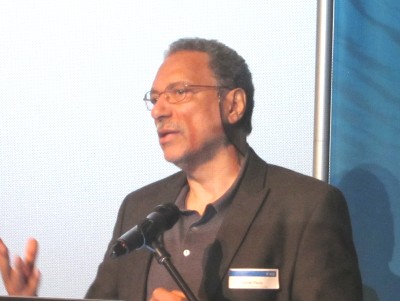 Ocean Wise celebrates 10th anniversary
Ocean Wise celebrates 10th anniversary
Global marine catches are going down. This is the sobering result of reconstructions of real catches around the world by the team of leading fisheries scientist Prof. Daniel Pauly. This contrasts with statistics compiled by FAO based on government reports.
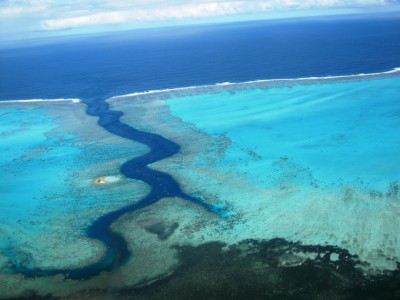 In the marine park of Poe, New Caledonia, the world seems still ok. The reefs and the lagoon are glittering in blue and turquoise.
In the marine park of Poe, New Caledonia, the world seems still ok. The reefs and the lagoon are glittering in blue and turquoise.
But when seasoned sailor Ivan Macfadyen returned from his last Pacific crossing he raised an ominous alarm: "I'm used to seeing turtles, dolphins, sharks and big flurries of feeding birds. But this time, for 3000 nautical miles there was nothing alive to be seen.”
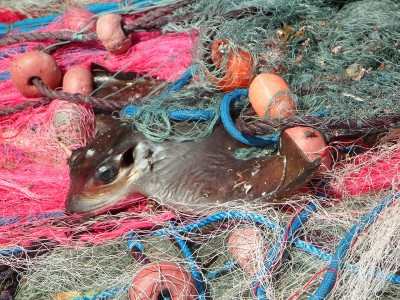 Researchers presented results on the pro and contra of management measures of the Common Fisheries Policy in Europe. Ralph Döring of the Thünen Institute coordinated the consortium of 25 teams from 12 countries. The final symposium also served to compare European experiences with those in other parts of the world. It is hoped that the results of the research open management rules to more participation not only by fishermen but also other actors. This way they can evolve and will, hopefully, be better observe. Read more.
Researchers presented results on the pro and contra of management measures of the Common Fisheries Policy in Europe. Ralph Döring of the Thünen Institute coordinated the consortium of 25 teams from 12 countries. The final symposium also served to compare European experiences with those in other parts of the world. It is hoped that the results of the research open management rules to more participation not only by fishermen but also other actors. This way they can evolve and will, hopefully, be better observe. Read more.
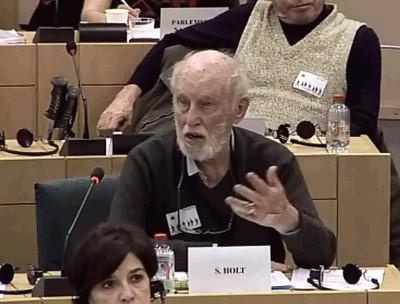 Dr Sydney Holt, one of the fathers of modern fisheries sciences, testified during the public hearing of the European Parliament's Fisheries Committee. He commended the goal of the European Common Fisheries Policy of considering Maximum Sustainable Yield as a limit, not a target. Remaining well below the fishing mortality needed to catch MSY makes fisheries profitable and stable. That now needs to be operationalised in plans and regulations. All other experts agreed. Read more about the hearing.
Dr Sydney Holt, one of the fathers of modern fisheries sciences, testified during the public hearing of the European Parliament's Fisheries Committee. He commended the goal of the European Common Fisheries Policy of considering Maximum Sustainable Yield as a limit, not a target. Remaining well below the fishing mortality needed to catch MSY makes fisheries profitable and stable. That now needs to be operationalised in plans and regulations. All other experts agreed. Read more about the hearing.
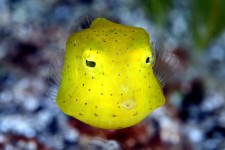 This Guineafowl puffer fish is at home throughout the Indo-Pacific. Its range extends from East Africa, east to Panama, north to the Ryukyu Islands, south to the Easter Island. In the eastern Pacific, it occurs in Guaymas and from Mexico to Ecuador.
This Guineafowl puffer fish is at home throughout the Indo-Pacific. Its range extends from East Africa, east to Panama, north to the Ryukyu Islands, south to the Easter Island. In the eastern Pacific, it occurs in Guaymas and from Mexico to Ecuador.
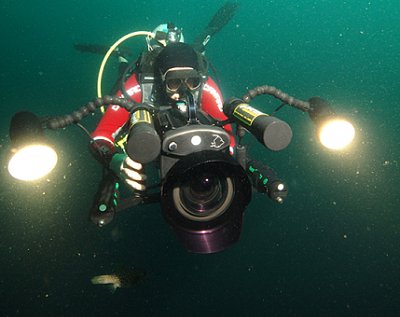 Interview with Danny van Belle, Underwater Photographer
Interview with Danny van Belle, Underwater Photographer
Danny van Belle is a renowned Belgian underwater photographer and videographer working with his wife as a "spotter" to document the beauty of marine life, particularly in the tropics. He was the president of the jury in the World Oceans Day 2014 contest organised by Mundus maris for young people to tell visual stories about the sea. Returning from his latest exploratory trip to the Pacific, Mundus maris was able to interview Danny van Belle about his work and how it changed over time. Read on here.
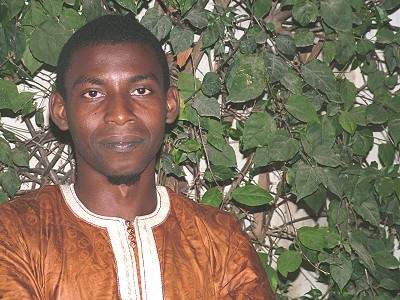 Birth certificates against school drop-outs in Hann, Senegal
Birth certificates against school drop-outs in Hann, Senegal
During preparations for World Oceans Day 2014 and the beach clean up with young people, Mundus maris became aware that there were lots of drop-outs in the fishing village of Hann, just outside the Senegalese capital Dakar. The reason? The youth had no birth certificates and official registration and were thus not admitted at school, at least not in secondary school. With a local team, three posts collected info about cases and out of 138 cases, initially recorded, 12 got their papers sorted out and could start the normal school year in October. Abdoulaye Fall has coordinated the recordings so far. Read more.
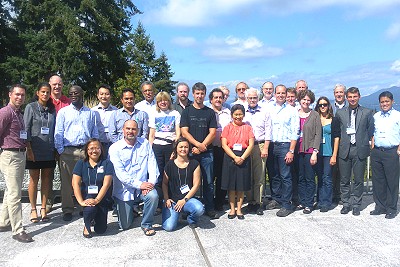 Mundus maris at the FishBase Symposium in Vancouver
Mundus maris at the FishBase Symposium in Vancouver
Can you believe that this year was already the 12th FishBase Symposium? It was held 8 September 2014 in Vancouver under the catchy motto “Big Old Data for Shiny New Insights – Using FishBase in Research”. FishBase is the most important scientific Internet portal of all fish in the world - and freely accessible. “Spaceship Earth” was the title of the Mundus maris contribution. It focused on a summary of the International Roundtable we co-organised in May with sponsorship of the Peter Wall Institute for Advanced Studies at the University of British Columbia (UBC) in Vancouver. The talk was kindly delivered by Rashid Sumaila (Director of the Fisheries Economics Unit at UBC) for Cornelia. Click here for ppt. More info about the Symposium here.
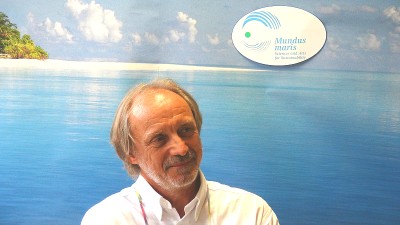 Video - interview with Dr Rainer Froese, FishBase Coordinator
Video - interview with Dr Rainer Froese, FishBase Coordinator
Dr Froese is one of the fathers of FishBase, the highly successful free web archive about all species of fish known to science. FishBase serves between one half and one million users every month. Dr. Froese's main concern is to promote sustainable seafood through good science and its explanation to everybody. So, in addition to doing excellent research he gives interviews and appears on tv.
Mundus maris asked Dr. Froese about threats to the oceans, what could be done about them and who was most responsive to the science. Click here to hear his answers.
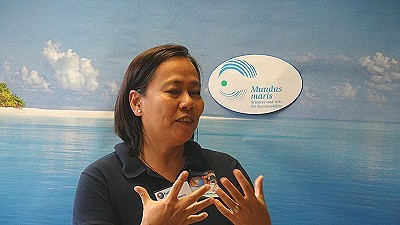 Video-Interview with Dr. Maria Palomares
Video-Interview with Dr. Maria Palomares
Hear what Filippino marine scientist Dr Maria (Deng) Palomares has to say why the ocean is important for her (and for all of us), what the major threats to the ocean are and what can be done about them. The original questions are the result of suggestions on our facebook page put forward to different people. The answers show interesting individual nuances, but also convergence on the major threats - and hope that together we can reverse the destructive trends. Click here to see the interview on the Mundus maris channel.
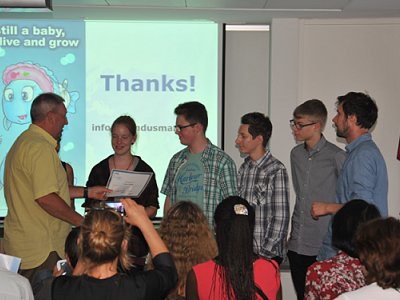 Cultural Soirée in Brussels to celebrate World Oceans Day, 11 June 2014
Cultural Soirée in Brussels to celebrate World Oceans Day, 11 June 2014
Beautiful music, evocative paintings, Spanish tapas, drinks and an engaged public - such were the "ingredients" of the conversation with the ocean.
This was the environment in which Danny van Belle, chair of the Jury, announced the winners of awards in visual story telling about the ocean. Depicted here is the team of the international German School in Brussels collaborating with the CEM in Cayar, Senegal, who won second prize among videos. Winner of first prize among Pecha Kucha stories went to "Biodiversity" by a multinational team from the ASEAN+3 for the Gifted in Science and Nacka Gymnasium Sweden. Read more.
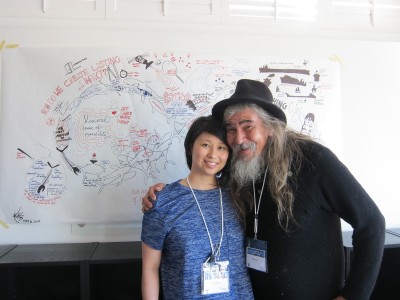 Spaceship Earth - International Roundtable at the Peter Wall Institute for Advanced Studies, Vancouver
Spaceship Earth - International Roundtable at the Peter Wall Institute for Advanced Studies, Vancouver
Between 5 and 9 May 2014, scientists, artists and practitioners met upon the invitation of a group including Mundus maris to discuss possibilities of meeting the challenges of living on our Blue Planet under siege. The participants were driven by the concern to develop new perspectives and space for action. They refused becoming resigned or cynical about the many depressing environmental and social indicators showing the threatened state of the ocean and ecosystems all over the world.
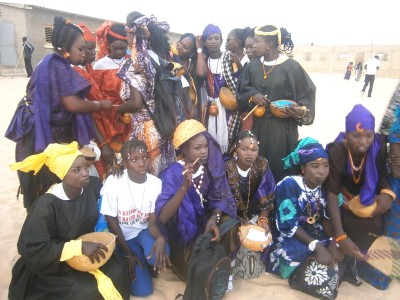 Culture Day at the CEM in Cayar
Culture Day at the CEM in Cayar
The Mundus maris Club of the school staged the foundation story of the village, because Cayar lives between the sea and the land as from its very origin. The inhabitants are becoming more conscious again of the necessary equilibrium between the two after years they have looked almost exclusively towards fisheries. But after a period of overexploitation the sea and the fisheries sector are suffering. The girls in traditional dress offered their performance as part of the programme of the day. Read more.
"Inseparable" - the campaign for sustainable fish and fisheries
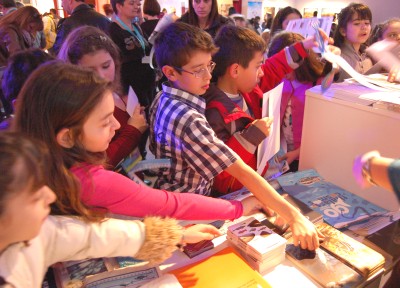 celebrated an event on March 17, at the "Technopolis" Cultural Centre in Athens, Opened by Mrs. Maria Damanaki, member of the European Commission, it sought to engage citizens around the motto "Let the juveniles become parents". A wide range of stakeholders participated. Mundus maris contributed popular babyfish bookmarks and fish rulers developed together with Prof. Stergiou and his teams in Greece and the FishBase Information and Research Group. The fish rulers show minimum length at which selected fish species reproduce in Greek waters. Much of the catch in Greece and around the Mediterranean consists of babyfish, but the kids understood that it is of utmost importance to protect the babies: they grabbed fish rulers and other information materials to learn more and be part of a growing movement saying NO to catching and cooking juveniles. Read more.
celebrated an event on March 17, at the "Technopolis" Cultural Centre in Athens, Opened by Mrs. Maria Damanaki, member of the European Commission, it sought to engage citizens around the motto "Let the juveniles become parents". A wide range of stakeholders participated. Mundus maris contributed popular babyfish bookmarks and fish rulers developed together with Prof. Stergiou and his teams in Greece and the FishBase Information and Research Group. The fish rulers show minimum length at which selected fish species reproduce in Greek waters. Much of the catch in Greece and around the Mediterranean consists of babyfish, but the kids understood that it is of utmost importance to protect the babies: they grabbed fish rulers and other information materials to learn more and be part of a growing movement saying NO to catching and cooking juveniles. Read more.







